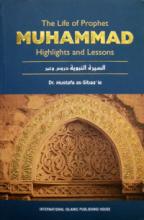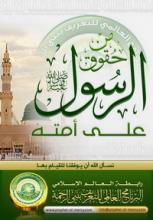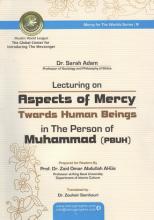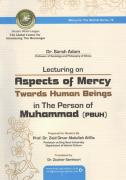The Prophet of Mercy Website
Muslim World League - Global Commission for Introducing the Messenger
When the Prophet, pbuh, says, “It is only an unfortunate person who is deprived of mercy,”[10] each one of his companions would make sure the Prophet’s statement of such horrible attribute did not apply to him. They were well aware of God’s account of the fire of Hell, “Only the unfortunate shall suffer its scorching pain” (Al-Lail: 15). Hence, they realized that salvation and the escape from such disaster is made possible by exercising mercy.It should be pointed out that such merciful behavior was not confined to this man only; it was, rather a norm of behavior to be applied by the judiciary and rulers that would succeed him, and indeed by all people. It involves helping those who slip to save their skins, and preclude the imposing of punishment on them.In this behavior, the Prophet, pbuh, has shown the way to those in charge to preclude punishment on the basis of mistakable evidence and this has become a well established Shari’ah rule among jurists and was adopted by the law scholars, more than a thousand years later, when they ruled that an accused person is innocent until proven guilty. Thus the credit of this merciful rule goes to the Prophet of Mercy, pbuh, and has come to be applied in a manner that realizes both justice and mercy.The examples we have cited, and have chosen to confine ourselves to for the sake of brevity, show that, for the Prophet, pbuh, mercy takes precedence and is considered a duty that is on a par with other duties, which is undoubtedly a bright prospect. At this juncture, a person in the audience raised his hand and said, “Some other persons may see in this a negative aspect, as such an approach might encourage indulgence in excesses and violations. What does the honorable lecturer think of that?”
Dr Adam thanked him and said, “This is a legitimate question and is worth considering. It is worth indicating, at first, that the Prophet, pbuh, has criticized exaggeration ,as such, anywhere and in any form. He said it in so many words, “Beware of exaggeration”[11], which is the exceeding of boundaries that leads to corruption, because virtue lies in the middle of two vices.Thus, exaggeration in the application of mercy, in terms of overdoing such application, is no less reprehensible than neglect of its application, when there is a need for giving it precedence so that it would lead to the realization of its purpose.The Prophet of Mercy, pbuh, has succeeded, in his words and deeds, what previous great figures have been unable to do. Such figures are either well known warring leaders famous for their strength, such as Alexander and Holagu, to whom virtues were virtually unknown; or are those who merely advocate virtues, mercy and tolerance, without practicing them..None of the two approaches would work, as neither always contains an enticement to associate oneself with. Thus the Prophet, pbuh, has advocated a balanced approach that combines both strength and mercy and mixed them in a brilliant way. Hence, his approach has succeeded, as we have seen how force protects mercy, just as mercy has refined strength and held the elements of evil under control
The Prophet of Mercy has implanted mercy in its proper soil and applied it in contexts that require it, thus realizing in so doing the best results, without neglecting or being oblivious of firmness and strength. Thus, I do not believe that there was any occurrence in which the Prophet, pbuh, gave precedence to mercy, no matter how hard we try to scrutinize the surrounding circumstances of the application thereof.There are several incidents that show that mercy could not prevail over other considerations. Thus during the lifetime of the Prophet, pbuh, there was a thief who was committing the sin of theft, and was reported to the Prophet, pbuh, who ordered that his hand be amputated. The effect of the pain and sorrow that the Companions saw on the face of the Prophet, pbuh, prompted one of them to say, “Please, forgive him, O, Messenger of God.” The Prophet responded saying, “This could have been possible before the matter was reported to me. But now that it has, it is out of the question.”[12]It also happened that a woman, who was a member of some reputed people, was reported to the Prophet, pbuh, as having stolen, and people thought of a way to save her from punishment. They asked his beloved Osamah ben Zaid to intercede and seek his forgiveness.
So Osamah approached the Prophet, pbuh, who said, “Would you intercede in a case of violation of God’s orders?” In his sermon, the Prophet, pbuh, said, “People before you were destroyed because when a notable person committed a theft, they would leave him alone, but when a weak person committed such a sin, they punished him. I swear by God, that if Fatimah, the daughter of Muhammad, were to steal, Muhammad would amputate her hand.” [13]The aforementioned cases clearly confirm that when values and established norms are involved, mercy would be out of the question. In the first case, the Prophet, pbuh, wished that the matter of the theft had not been brought before him. But once, such a matter is brought before a ruler, he may not freeze the application of rules, lest this be a precedent for other rulers succeeding him.In the second case, the woman happened to belong to a nobility class. In such case, mercy would mean the abolishing of justice among the majority of people, and the establishment of privileges for high society, which the Prophet, pbuh, would never consider under any circumstances. For this the sentences were carried out, and he overruled considerations of mercy under such circumstances.
I must not omit saying that this woman had become a welcome person in the Prophet’s household and paid frequent visits to Aisha, the Prophet’s wife, who used to bring the woman’s needs to the Prophet, pbuh, and he used to promptly respond to her needs, by way of mercy for her and restitution of her position in society, after she had suffered the prescribed punishment for her theft. Thus Islam has no place for individuals with previous “criminal” records, unlike positive law, which follows the convicted person, even after his having reformed after the punishment had been inflicted on him.The Prophet, pbuh, was keen on respecting and preserving the prestige of Islam before his adversaries, lest any of them should entertain any adverse intentions and encroaches on the Prophet, pbuh, and his followers, when such adversaries feel secure against punishment and hope for forgiveness. It has been said that whoever feels secure against punishment will forget good manners.
Thus, in a case such as this, mercy should make way to justice. It happened once that the Muslims took a man called Abou Izzat Al-Jumahi, prisoner. The man was a poet, who dedicated his poetry to wage a war against the Prophet, pbuh, just as he fought him with his sword in the battle of Badr. The man begged the Prophet to release him after he had given the Prophet his word not to fight him any more. The Prophet, pbuh, took pity on him and released him, out of mercy, without taking a ransom from him, unlike the treatment of other prisoners, who were released after being ransomed.However, two years later, the same man was taken prisoner in the battle of Hamraa al-Asad, that followed the battle of Uhod. So, he begged the Prophet again to release him once more, but the Prophet refused and said, “You shall never enter Mecca once more and say you have deceived Muhammad twice. A believer will never be bitten twice by the same poisonous snake.” Then he gave orders the man to be executed.This behavior of the Prophet falls within the scope of mercy and consolidates it in the souls of his companions, as it constitutes a lesson to those who indulge in wishful thinking of being forgiven after committing evil deeds. Thus, when this man lost his life as a result of his awesome deeds, his destiny constituted a mercy for mercy itself, lest it should be misinterpreted and lose its effect.It must be pointed out that this event was not a rare occurrence, for it was followed by similar events in which the same motives and circumstances were repeated, thus making it difficult for some people to reconcile them with the forms of phenomena of mercy in the life of the Prophet, pbuh..
In this respect, I would like to quote the analysis of Professor Aqqad, who said, “Among the special characteristics of the greatness of the Prophet, pbuh, is the fact that his fanatic enemies attributed to him two contradictory qualities. Thus, for some, he was too lenient to fight, and for others, he was so cruel as to fight and shed human blood for no reason or cause. But Muhammad, pbuh, was neither this nor that.Thus, while his courage refutes the suspicion of the leniency of weakness and shameful fear, his whole life, ever since his early childhood, refutes the suspicion of cruelty and hostility. Thus, in all his relations with the members of his family, his wet nurses, companions and wives, he was a paragon of unequalled mercy, even among prophets.[14]In this context, it is proper to talk of a methodical question connected with the studies by some non-Muslim thinkers, of the biography of Prophet Muhammad, pbuh. When reading their books in this respect, one feels that some of them focus on one aspect of the life of the Prophet, pbuh, whether deliberately or not, in order to portray him to readers as being characterized by this attribute only
This approach, regardless of its motives, is a crime against the truth and fails to respect the minds of readers. It reminds me of the book written by A. Schiller on those who trifle with people’s minds.Searching the pages of the biography of Prophet Muhammad, pbuh, for evidence of his mercy, forbearance and tolerance, will reveal such evidence in abundance. Also evidence that reveals his strength, firmness and ability to kill his enemies, without responding to their begging to spare their lives, exists in abundance.But no one will find anything through which to hide one aspect in his biography at the expense of another. May be some of them lack the scientific, methodical or neutral qualifications to refute an illusory contradiction between his two opposite qualities. It was this that has prompted Professor Aqqad to say that greatness, in the eyes of enemies, is perceived as a contradiction.Allow me, dear audience, to make a short digression in order to consider a matter that is connected with our subject. I refer to the view of the Prophet, pbuh, held by non-Islamic communities in their portrayal of him as cruel , restricting freedom and punishing for sins, unlike Jesus Christ.I have read in this respect an analysis that is worth quoting, namely, “When the utilitarian thought prevailed among Westerners, adherence to the person of Christ came to represent the culmination of utilitarianism to those who accepted religion. Thus, for such people, Christ has paid for their sins, even before they commit same, and has left them to live and commit whatever acts they wish, since, as long as the love of Christ, as an individual and as a god, dominates their feelings.
As to those who have abandoned Christianity altogether and became atheists, Christ was at the center of their views after the distortion of religion. He was considered him an individual, and hence he could be different from other human beings.Moreover, in the picture depicted of Christ by the Western Church, he was portrayed as merciful and isolated from the life of people, admitting all values of human life – as people desire for themselves – advocating nothing but freedom and equality, which are the most important secular values, which do not clash with those who have abandoned religion, and hence, there was no need to clash with Christ.[15]Now if Christ is characterized by such qualities, then Prophet Muhammad, pbuh, is his very opposite. This is how his adversaries portray him in order to distance people from loving and following him. It is a pity that such illusions have crept into the minds of many in Western communities, particularly after their religious orientation has been weakened.People with such convictions love those who let them alone to do what they desire, without anyone to control or them or to bring them to account. This is represented by Christ, in their view. Moreover, they are averse to those who require them to assume certain obligations and duties and bring them to account for such requirements. This is how they view Prophet Muhammad, pbuh.
It is a pity to hear such naïve views, which is not proper to advocate for people who respect their own minds. This view is first and foremost harmful to Christ, pbuh., when he is so portrayed to people in such a manner as to deprive him of the attribute of prophethood, of a reformer and of an ardent educator, making him merely a bridge to their passions and a carrier of their sins.Allow me to give an example., which is beneath your level. So please forgive me for bringing it up. Let us suppose that we have two physicians in a community, one who keeps an eye on his patients, informs them frankly regarding their diseases, prescribes sometimes some bitter medication for them, advises them to avoid certain things which they like, and interferes with their private life.The other physician, if he exists at all, goes along with the desires of his patients, does not prevent them from anything they like to do or does not censure them when he finds that they are doing something that is detrimental to their health and does not reveal to them their actual health condition nor warns them when necessary.Now, who is more keen on protecting his patients? Which one of them has been faithful to his duty? Which of them earns the respect of people, even at a later stage? Which one is merciful towards the members of his community?The reply to these questions which I believe no one would dispute reveals the naivety of those illusions, which some who trifle with the minds of people, are advocating.
“I, personally”, says Dr. Adam, “believe that fair-minded people, and I do not mean friends only, consider what has been termed as contradiction, a balanced, middle of the way and integral attitude.The positions of Prophet Muhammad, pbuh, which history has recorded, have become an ethical theory, which is not restricted to any time, place or environment, and history has preserved their privileged status.Thank you, dear audience, for your attentive listening and see you at the next lecture.”
------------------------------
[1] Al-Bukhari, the Book of adhan, in the Section on the shortening of prayer when a baby cries, tradition 1707.
[2] Al-Bukhari, in the Section on The Imam shortening prayer in case of emergency, tradition 989.
[3] From the Attributes of the Prophe, p.210, ibid.
[4] Reported by Muslim, in the Section on Ordering Imams to lighten prayer, tradition 4t68.
[5] SaHih Muslim, the Book on the prayer of travelers and its shortening, in the Section on Encouraging night prayer in Ramadan (tarawiH), tradition 761.
[6] Reportd by Al-Bukhari, in the Section on the Prophet’s Encouraging people to perform night prayer, tradition 1128
[7] See Dr. Majdi Atef, Dictionary of Sociology, p.210.
[8] SaHih Al-Bukhari, The Book on Sales, in the Section on He who gives respite to a person in financial difficulty, tradition 2078.
[9] SaHiiH al-Bukhari, Kitaab al-MuHaaribiin, the Section on “Does the Imam ask the Confessing Culprit: ‘You might have (just) touched or winked?, Tradition 6824’
[10] Reported by al-Tirmidhi, the Section on The Mercy of Muslims, tradition 1923, and admitted its authenticity>
[11] Reported by Ibn Majah, The Book on Rites, tradition 3029, which is an authentic tradition. See Al-Albani, Sahih Ibn Majah, v.3, p.49,.
[12] Reported by Imam Malek in his book Al-Mawte’ ,in the Section on the cancellation of intercession if the matter is reported t the authorities.
[13] SaHih Al-Bukhari, the Book on the virtues of the Prophet’s companions, in the Section on the incident involving Osamah ben Zaid.
[14] Mahmoud Al-Aqqad, The Genius of Muhammad, p. 77.
[15] Hisham Juait, Europe and Islam, pp62-63, with some adaptation.








